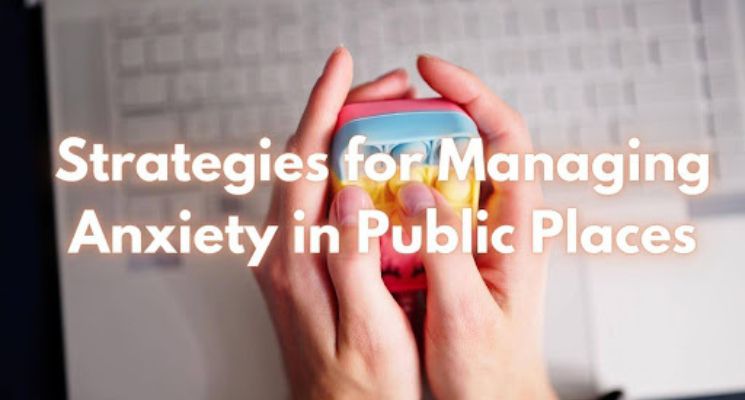“By failing to prepare, you are preparing to fail.” – Benjamin Franklin
Manage anxiety in public places with proven strategies! From preparation and mindfulness to behavioral techniques and environmental adjustments, this guide provides the tools to regain control and embrace life confidently. Dive in and discover your path to peace.
These centers combine therapeutic techniques with holistic approaches, providing a supportive environment to overcome anxiety. Incorporating these methods can significantly enhance your path to a calmer, more balanced life.
- Preparation and Planning
A study by the Anxiety and Depression Association of America showed that 72% of respondents thought that being ready or organized can help reduce anxiety in social situations. Understanding potential triggers, learning coping mechanisms, and visualizing successful outcomes can enhance self-confidence and preparation for managing anxiety.
- Identify Potential Triggers and Sources of Anxiety
The first step to effective preparation is recognizing and knowing your triggers. They may be anything from certain conditions such as large crowds or speaking in public to more generalized sources of concern such as fear of being judged or evaluated socially. By identifying your triggers, you can anticipate and better manage the situations that may provoke anxiety.
For example, mental illness is a growing problem in the state of Florida, with issues including depression, anxiety, bipolar disorder, and schizophrenia. Although the state offers several payment-assisted facilities providing low-cost treatment for mental illness. In 2013, Florida ranked 49th among the states for mental health programs, spending an average of $37.28 per person.
Seeking support from professionals at a Florida rehabilitation center can provide personalized strategies and therapeutic techniques to manage anxiety effectively. Many Florida-based centers specialize in anxiety treatment, offering resources and support to help individuals get out of their fears and regain control in public settings.
- Develop a Coping Strategy and Plan Ahead
Identify what triggers your anxiety and develop a personal coping strategy. Use techniques like deep breathing, positive self-talk, or confiding in a friend. Plan ahead by researching the environment, having exit strategies, and practicing exposure to feel more prepared and confident.
- Visualization of Positive Results and Good Experiences
Do not underrate the power of visual images. If you practice positive results in public situations in your mind, you can get your mind ready for achievement and reduce the anxiety that comes before such events.
II. GROUNDING AND MINDFULNESS
While preparation is important, grounding and mindfulness are among the most powerful techniques for managing sudden anxiety. Being anchored in the present moment and using focused breathing can lead to experiencing peace and regaining control.
- Exercises for Deep Breathing
Deep breathing exercises are an uncomplicated yet effective means of turning on the body’s relaxation response as opposed to symptoms of anxiety like rapid heart rate or shallow breathing. Techniques such as box breathing or diaphragmatic breathing will assist you to regain control during anxiety attacks.
- Grounding and Sensory Awareness
Using your senses to stay present is what sensory awareness and grounding entail. Touch an object’s texture, smell a scented candle, or look around you. Concentration on senses helps displace attention from worrying thoughts and reconnects people with reality.
- Present Moment Focus Mindfulness Meditation
Maintaining awareness of the present moment without judgment requires effort during mindfulness meditation and focusing on the present. Mindfulness breaks anxiety-based thought patterns, fostering acceptance and more balanced judgments.
III. Cognitive Restructuring and Self-Talk
Apart from mindfulness, cognitive restructuring, and self-talk can also be influential in regard to the way we conceive of or respond to anxiety-provoking situations.
- How Are Irrational Thoughts Challenged?
Anxiety is often caused by irrational thinking that exaggerates potential negative outcomes without reason. By actively challenging these thoughts and replacing them with more realistic and balanced perspectives you may decrease your anxiety levels as well as restore a sense of control.
- Rephrase Negative Self-Talk with Positive Affirmations
Negative self-talk reinforces feelings of anxiety, creating a cycle of self-doubt and fear. You can deliberately reframe these negative statements into positive affirmations in order to shift your mindset toward cultivating a more empowering inner voice.
- Show Compassion Toward Yourself and Accept Who You Are
Anxiety often happens on an individual basis but it is commonly socially stigmatized which may make someone feel humiliated or self-condemned. To show compassion to yourself, acknowledge what happened as you would support a friend.
IV. Behavioral Strategies
While cognitive strategies are crucial, behavioral approaches also play a significant role in managing social phobia. Studies have shown that exposure therapy can significantly reduce anxiety symptoms, with improvements ranging up to 90 percent. It’s possible to become less sensitive and regain control of oneself by gradually exposing one’s self into situations that cause anxiety while using such things as distractions or getting assistance.
- Gradual Exposure and Desensitization
Anxiety management through gradual exposure and desensitization entails systematic confrontation with fears. You should start from the least fearful scenarios before proceeding to the more challenging ones. Your body should be given time to adjust gradually until your anxiety response becomes less intense.
- Diversion Methods
During highly anxious moments, diversionary measures can prove very important because they can change your focus thus reducing anxious thoughts and feelings’ intensity. Distraction techniques such as music, puzzles, games, audiobooks, or podcasts can be effective.
- Seeking Support from Trusted Friends or Family Members
A friend or family member who understands you well will go a long way in helping you deal with public anxiety adequately. Protectiveness may come from being accompanied during tense moments plus having someone else listen to your story will validate it for you—a trusted person you know well enough might even offer some advice about what to do next. Seeking support can greatly reduce anxiety.
V. Environmental Modifications
While internal strategies are important in managing anxiety in public places, external factors are also crucial. Intentionally changing your environment can make it feel safer and more comfortable, thus reducing intense anxiety triggers.
- Locate “Safe Spaces” or Quiet Areas
When anxiousness becomes unbearable, it is helpful to know where “safe spaces” or quiet areas are located within public settings. These places offer relief from stimuli, providing an opportunity to regroup and use other coping skills.
- Bring Along Comfort Items or Anchors
Possessing something soothing such as a stress ball, a piece of jewelry or some token is very handy when you end up somewhere that makes you anxious. Such items assist in tethering you to the present moment during times when anxiety escalates.
- Adjust Sensory Stimulation
Sensory stimuli like loud noises and strong smells can intensify anxiety in public places. Noise canceling earphones, and shades among others can help with these sensations providing a more comfortable atmosphere around you.
Conclusion
Managing anxiety in public areas is a journey that requires the right strategies to regain control and embrace life with confidence. Effective methods include preparation, mindfulness techniques, altering improper thinking patterns, employing behavioral methods, and making environmental modifications. Celebrate small wins, be patient with yourself, and practice regularly. Asking for help when needed can also facilitate overcoming anxiety, and opening up new opportunities.
FAQS
- Can medication help manage anxiety in public places?
Medication can be effective in managing anxiety when used with other strategies. Consult a mental health professional to see if it’s appropriate for you and to get guidance on dosage and side effects.
- How do I explain my anxiety to others in public situations?
You don’t owe anyone an explanation, but if you feel comfortable, you can mention that you experience anxiety and may need to step away or use coping strategies. Most people will understand.
- What if the anxiety becomes overwhelming, and I need to leave?
If anxiety becomes overwhelming, it’s okay to leave. Have a plan for a safe exit and prioritize your well-being.










